八年级上册英语知识点总结归纳(最新)
八年级上册英语知识点归纳总结

八年级上册英语知识点归纳总结1.八年级上册英语知识点归纳总结篇一连接代词和连接副词引导的宾语从句。
1. 由连接代词 who, whom, whose, what, which 等引导,不能省略。
例如:Do you know who he is?2. 由连接副词 how, where, when, why 引导,也不可省略。
例如:I don't know where I can buy this kind of camera.3. 宾语从句用陈述句语序,即:连接词 + 主语 + 谓语 + 其他。
4. 主句与从句的时态关系:(1) 如果主句是一般现在时,从句可以是根据情况所需要的任何时态。
例如:I don't know when she came here.Can you tell me when he will come here?(2) 如果主句是过去的时态,从句也应用过去时态的某一种。
但若从句是表示客观事实或真理时,从句时态不受主句时态的限制,应用一般现在时。
例如:He told us why he would stay at home the next day.The teacher explained how the earth goes around the sun.5. 某些由连接代词或连接副词引导的宾语从句可改为含“特殊疑问词 + 动词不定式”结构的简单句。
例如:Can you tell me where I can buy this book?Can you tell me where to buy this book?2.八年级上册英语知识点归纳总结篇二单音节形容词和部分双音节词大多是以y、ly、er结尾的双音节形容词,一般在词尾加-er。
以不发音字母e结尾的词,在词尾直接加-r。
重读闭音节词词尾只有一个辅音字母,元音发短音时,双写尾字母,再加er。
以“辅音字母+y”结尾的双音节词,变“y”为“i”,再加-er。
八年级上册英语重点知识点归纳
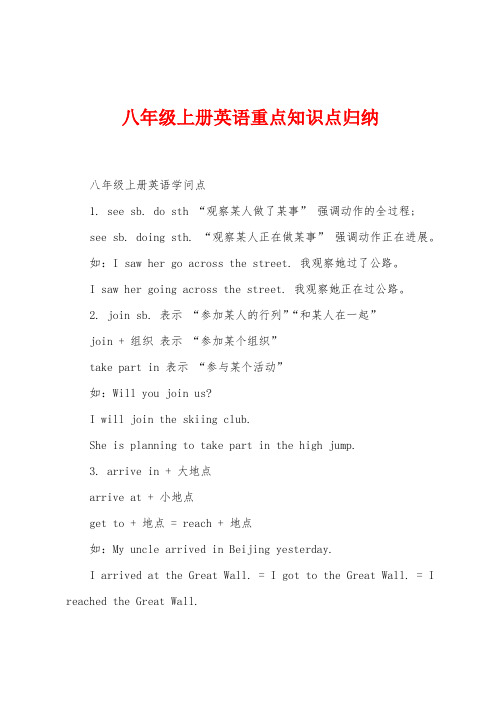
八年级上册英语重点知识点归纳八年级上册英语学问点1. see sb. do sth “观察某人做了某事”强调动作的全过程; see sb. doing sth. “观察某人正在做某事”强调动作正在进展。
如:I saw her go across the street. 我观察她过了公路。
I saw her going across the street. 我观察她正在过公路。
2. join sb. 表示“参加某人的行列”“和某人在一起”join + 组织表示“参加某个组织”take part in 表示“参与某个活动”如:Will you join us?I will join the skiing club.She is planning to take part in the high jump.3. arrive in + 大地点arrive at + 小地点get to + 地点 = reach + 地点如:My uncle arrived in Beijing yesterday.I arrived at the Great Wall. = I got to the Great Wall. = I reached the Great Wall.留意:reach here/there/home = get here/there/home = arrive here/there/home4. leave…离开……leave for…动身去…/离开到…如:They are leaving Beijing tomorrow. 明天他们要离开北京。
They are leaving for Japan the day after tomorrow. 后天他们要前往日本。
5. a few“几个,一些”修饰可数名词a little“一点点”修饰不数名词如:There are a few eggs in the basket.There is a little water in the bottle.6. how long 表示“多久(时间)”; 提问时间段.how often 表示“多常; 多久一次”; 提问时间的频率.如: They will stay in Beijing for a week. → How long will they stay in Beijing?He plays basketball twice a week. → How often does he play basketball?7. be good at (doing) sth. = do well in (doing) sth. 擅长于(做)某事如:She is good at (playing) baseball. = She does well in (playing) baseball.8. make sth/sb + adj. 使某物(某人)在某种状态keep …sth/sb + adj. 保持某物(某人)在某种状态如:Playing soccer can make your body strong.Swimming can help to keep your heart and lungs healthy.八年级英语语法学问一般将来时1. be going to 构造①表示主语规划、准备做某事。
英语八年级上册重点知识归纳
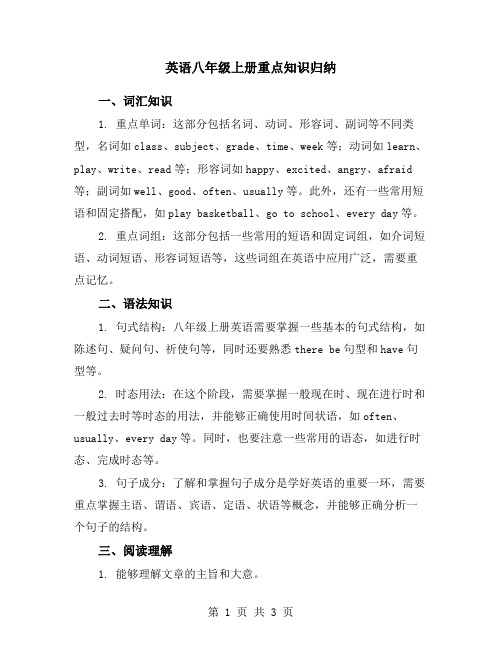
英语八年级上册重点知识归纳一、词汇知识1. 重点单词:这部分包括名词、动词、形容词、副词等不同类型,名词如class、subject、grade、time、week等;动词如learn、play、write、read等;形容词如happy、excited、angry、afraid 等;副词如well、good、often、usually等。
此外,还有一些常用短语和固定搭配,如play basketball、go to school、every day等。
2. 重点词组:这部分包括一些常用的短语和固定词组,如介词短语、动词短语、形容词短语等,这些词组在英语中应用广泛,需要重点记忆。
二、语法知识1. 句式结构:八年级上册英语需要掌握一些基本的句式结构,如陈述句、疑问句、祈使句等,同时还要熟悉there be句型和have句型等。
2. 时态用法:在这个阶段,需要掌握一般现在时、现在进行时和一般过去时等时态的用法,并能够正确使用时间状语,如often、usually、every day等。
同时,也要注意一些常用的语态,如进行时态、完成时态等。
3. 句子成分:了解和掌握句子成分是学好英语的重要一环,需要重点掌握主语、谓语、宾语、定语、状语等概念,并能够正确分析一个句子的结构。
三、阅读理解1. 能够理解文章的主旨和大意。
2. 能够理解文章的细节和事实。
3. 能够根据上下文猜测生词的意思。
4. 能够理解作者的观点和态度。
5. 不断提高阅读速度和理解能力。
四、写作知识1. 写作技巧:掌握一些基本的写作技巧,如正确的语法、拼写和标点符号,以及正确的文章结构等。
2. 写作实践:通过不断的写作练习,提高自己的写作能力。
除此之外,八年级上册英语还需要注意以下几个方面:1. 听力训练:每天坚持进行听力训练,提高听力理解能力。
2. 口语表达:鼓励学生多进行口语练习,提高口语表达能力。
在口语表达中要注意语音、语调和语速等方面的问题,同时也要注意表达的准确性和得体性。
人教版八年级英语上册语法总结

人教版八年级英语上册语法总结一、一般现在时。
1. 概念。
- 表示经常或习惯性的动作或状态;表示客观事实或普遍真理。
- 例如:I often get up at six o'clock.(经常的动作)- The earth goes around the sun.(客观真理)2. 动词形式。
- 当主语是第三人称单数(he/she/it等)时,动词要加 -s或 -es。
- 一般情况加 -s,如:like - likes;以s, x, ch, sh, o结尾的动词加 -es,如:go - goes, watch - watches;以辅音字母 + y结尾的动词,把y变为i再加 -es,如:study - studies。
- 当主语不是第三人称单数时,动词用原形。
例如:They play football every day.3. 句型结构。
- 肯定句:主语+动词(原形/第三人称单数形式)+其他。
- 否定句:主语+don't/doesn't+动词原形+其他。
(do not = don't,does not = doesn't)- 一般疑问句:Do/Does+主语+动词原形+其他?回答:Yes, 主语+do/does. No, 主语+don't/doesn't.二、一般过去时。
1. 概念。
- 表示过去某个时间发生的动作或存在的状态。
- 例如:I went to the park yesterday.2. 动词形式。
- 一般动词在词尾加 -ed,如:play - played;以不发音的e结尾的动词加 -d,如:live - lived;以重读闭音节结尾且末尾只有一个辅音字母的动词,双写这个辅音字母再加 -ed,如:stop - stopped;以“辅音字母 + y”结尾的动词,把y变为i再加 -ed,如:study - studied。
还有一些不规则动词,如:go - went, see - saw等。
英语八年级上册三单元知识点总结

英语八年级上册三单元知识点总结一、重点单词。
1. outgoing.- 形容词,意为“外向的;友好的;爱交际的”。
例如:My sister is more outgoing than me.(我的姐姐比我更外向。
)2. both.- 形容词、代词和副词,意为“两个;两个都”。
作形容词时,可修饰可数名词复数形式,如:Both girls are from China.(这两个女孩都来自中国。
)作代词时,可单独作主语、宾语等,如:Both of them like reading.(他们两个都喜欢阅读。
)作副词时,常位于be动词之后,实义动词之前,如:They are both students.(他们两个都是学生。
)3. better.- 形容词或副词well和good的比较级,意为“更好的(地);较好的(地)”。
例如:This book is better than that one.(这本书比那本更好。
)He sings better than his brother.(他唱歌比他弟弟唱得好。
)4. loudly.- 副词,意为“喧闹地;大声地;响亮地”。
它和loud作副词时的区别在于:loudly多含有“吵闹”的意味,而loud常指说话声、笑声等的响亮。
例如:Don't talk so loudly in the library.(不要在图书馆如此大声地说话。
)5. quietly.- 副词,意为“轻声地;轻柔地;安静地”。
例如:He closed the door quietly.(他轻轻地关上门。
)6. hard - working.- 形容词,意为“工作努力的;辛勤的”。
例如:My mother is a hard - working woman.(我的妈妈是一个勤劳的女人。
)7. competition.- 名词,意为“比赛;竞赛;竞争”。
例如:There will be a singing competition next week.(下周将有一场歌唱比赛。
最新人教版八年级上册英语知识点总结 成为英语小能手 快速提高听说读写能力

最新人教版八年级上册英语知识点总结成为英语小能手快速提高听说读写能力最新人教版八年级上册英语知识点总结英语是一门世界通用的语言,对于学习者而言,掌握好英语是非常重要的。
本文将为大家总结人教版八年级上册英语的知识点,帮助大家快速提高听说读写能力。
一、语法知识1. 一般现在时(Simple Present Tense):用于描述经常性的动作或客观事实。
例句:I often go to school by bus.2. 一般过去时(Simple Past Tense):用于描述过去发生的动作或状态。
例句:She watched a movie last night.3. 一般将来时(Simple Future Tense):用于表示将来要发生的动作或情况。
例句:I will visit my grandparents next week.4. 现在进行时(Present Continuous Tense):用于表示现在正在进行的动作。
例句:They are playing football in the park.5. 现在完成时(Present Perfect Tense):用于表示过去发生但与现在有关的动作。
例句:We have lived here for five years.6. 情态动词(Modal Verbs):用于表示能力、允许、必须、愿意等情态。
例句:You should finish your homework on time.7. 被动语态(Passive Voice):用于强调动作的承受者而不是执行者。
例句:The book was written by a famous author.二、词汇积累1. 常用动词(Verbs):如read、write、speak等。
2. 日常生活词汇(Daily Life Vocabulary):如food、clothes、weather等。
3. 时间词汇(Time Vocabulary):如Monday、morning、year 等。
8年级上册英语全部知识点

8年级上册英语全部知识点一、Unit 1 Where did you go on vacation?1. 重点单词。
- anyone pron. 任何人,常用于否定句和疑问句中。
例如:Did you meet anyone interesting?- anywhere adv. 在任何地方,用于否定句和疑问句。
如:I can't find my pen anywhere.- wonderful adj. 精彩的;绝妙的。
可以用来形容经历、事物等,例如:We had a wonderful time on the beach.- few adj. & pron. 不多;很少,修饰可数名词复数,表示否定意义。
例如:Few students like this difficult subject.- quite a few相当多;不少,后接可数名词复数。
例如:There are quite a few books on the shelf.- most adj., adv. & pron. 最多;大多数。
例如:Most students in our class like English.- something pron. 某事;某物,常用于肯定句中。
例如:I have something important to tell you.- nothing pron. 没有什么;没有一件东西,例如:There is nothing in the box.- everyone pron. 每人;人人;所有人,例如:Everyone should follow the rules.- myself pron. 我自己;我本人,是反身代词。
例如:I can look after myself.- yourself pron. 你自己;您自己,例如:You should believe in yourself.2. 重点短语。
八年级上册英语人教版知识点总结归纳
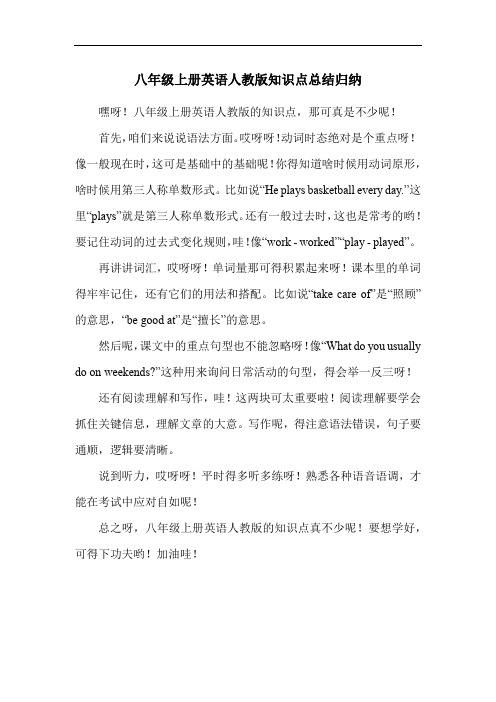
八年级上册英语人教版知识点总结归纳
嘿呀!八年级上册英语人教版的知识点,那可真是不少呢!
首先,咱们来说说语法方面。
哎呀呀!动词时态绝对是个重点呀!像一般现在时,这可是基础中的基础呢!你得知道啥时候用动词原形,啥时候用第三人称单数形式。
比如说“He plays basketball every day.”这里“plays”就是第三人称单数形式。
还有一般过去时,这也是常考的哟!要记住动词的过去式变化规则,哇!像“work - worked”“play - played”。
再讲讲词汇,哎呀呀!单词量那可得积累起来呀!课本里的单词得牢牢记住,还有它们的用法和搭配。
比如说“take care of”是“照顾”的意思,“be good at”是“擅长”的意思。
然后呢,课文中的重点句型也不能忽略呀!像“What do you usually do on weekends?”这种用来询问日常活动的句型,得会举一反三呀!
还有阅读理解和写作,哇!这两块可太重要啦!阅读理解要学会抓住关键信息,理解文章的大意。
写作呢,得注意语法错误,句子要通顺,逻辑要清晰。
说到听力,哎呀呀!平时得多听多练呀!熟悉各种语音语调,才能在考试中应对自如呢!
总之呀,八年级上册英语人教版的知识点真不少呢!要想学好,可得下功夫哟!加油哇!。
新版英语八年级上册第四单元知识点归纳1

Unit4 What’s the best movie theater一、短语归纳movie theater电影院come true实现;达到clothes store服装店so far到目前为止talent show才艺表演take…seriously仔细对待in common共同;共有around the world世界各地;全世界in town在镇上more and more……越来越…… and so on等等all kinds of……各种各样的make up编造(故事, 谎言等)not everybody并不是每个人close to…离……近cheap—cheaper cheaply—more cheaply loudly —more loudly boring – more boringcarefully – more carefully fresh – freshest二, 知识点归纳1.pla..rol.in…在……方面发挥作用/有影.pla..rol.i.doin.sth.发挥做某事的作用2.fo.example例.后直接加例子(同类事物中的一个例子)such as 后加逗点在加例子(多个例子)3.giv.sb.sth.给某人某.. giv.st.t.sb.把某物给某人4.sho.s.st.展示某人某. sho.st.t.sb..把某物展示给某.5.Thank.fo.doin.sth.因做某事而感谢。
6.b.u.to是……的职责;由……确.(to为介词)b.u.t.sb.t.d.sth.由某人确定去做某.7.watc.sb.d.sth.观看某人做某事8.on.of+可数名词的复.……之一one of + the adj最高级+ 名词复数最……的……之一9.fee.lik. finis..kee..enjo. practic. hav.fu.后接动词接doing的形式三, 句子1.It's the closest to home.它离家最近。
八年级上册英语重点知识点

八年级上册英语重点知识点英语重点学问点一、重点短语1. on time2. best wishes3. give a talk4. for example5. short for6. a waste of time7. go on a field trip8. go fishing9. I agree10. next week11. the day after tomorrow12. have a picnic13. have some problems doing sth.14. go the wrong way15. hurry up16. get together17. in the open air18. on Mid-Autumn Day19. come over20. have to21. get home22. agree with23. in the country24. in town25. all the same26. in front of27. on the left/right side28. next to29. up and down30. keep healthy31. grow up32. at the same time33. the day before yesterday35. last Saturday36. half an hour ago37. a moment ago38. just now39. by the way40. all the time41. at first二. 重要句型1. have fun doing sth.2. Why dont you?3. Were going to do sth.4. start with sth.5. Why not?6. Are you going to?7. be friendly to sb.8. Youd better do sth.9. ask sb. for sth.10. say goodbye to sb.11. Good luck(with sb)!三. 交际用语1.Welcome backto school!2.Excuse me. Im sorry Im late, because the traffic is bad.3.It doesnt matter.4.Happy Teachers Day !5.Thats a good idea.6.What are you going to do?7.Where are we going ?8.What are we going to do ?9.Im good at10.Its not far from11. Are you free tomorrow evening?12.Would you and Lily like to come over to my home for Mid-Autumn Festival?13.Im glad you can come.14.Thanks for asking us.15.How about another one?16.May I have a taste?17.Let me walk with you.18.What do you have to do?19.Do you live on a farm?20.Which do you like better, the city or the country?21.Which do you like best, dogs, cats or chickens?22.Shall we go at ten? Good idea!23.---Lets make it half past one. ---OK.24.---Why not come a little earlier? ---All right.25.Excuse me. Wheres the nearest post office, please?26.Its over there on the right.27.Im sorry I dont know.28.Youd better29.Thank you all the same.30.Which bus do I take?31.Go along this road.32.What day was it yesterday?33.Im sorry to hear that.34.I hope youre better now.35.Why did you call me?36.I called to tell四. 重要语法1.be going to的用法;2.形容词的比拟级、最高级;3.形容词和副词的比拟4.一般过去时五.重要学问点讲解1. on the street / in the street表示在街上时,on the street 和in the street 都可以,在美国多用on the street, 在英国多用in the street. 例如:We have a house in the street. 我们在街上有座房子。
八年级上册英语重点语法归纳

八年级上册英语重点语法归纳一、一般过去时。
1. 概念:表示过去某个时间发生的动作或存在的状态。
2. 标志词:yesterday(昨天), last week(上周), last month(上个月), last year(去年), two days ago(两天前), in 1990(在 1990 年)等。
3. 构成:- 主语 + was / were + 其他(主语是第一人称 I 和第三人称单数用 was,其他人称用 were)- 主语 + 动词的过去式 + 其他。
4. 动词过去式的构成规则:- 一般在动词末尾加 -ed,如:play - played。
- 结尾是 e 的动词加 -d,如:like - liked。
- 重读闭音节词,双写末尾辅音字母再加 -ed,如:stop - stopped。
- 以辅音字母 + y 结尾的动词,变 y 为 i 再加 -ed,如:study - studied。
二、频度副词。
1. 常见的频度副词有:always(总是), usually(通常), often(经常), sometimes(有时), seldom(很少), never(从不)2. 频度副词在句中的位置:通常放在实义动词之前,be 动词、助动词或情态动词之后。
三、形容词和副词的比较级和最高级。
1. 比较级的构成规则:- 一般在词尾加 -er。
- 以不发音的 e 结尾的词加 -r。
- 重读闭音节词,双写末尾辅音字母再加 -er。
- 以“辅音字母 + y”结尾的词,变 y 为 i 再加 -er。
- 多音节词和部分双音节词在前面加 more。
2. 最高级的构成规则:- 一般在词尾加 -est。
- 以不发音的 e 结尾的词加 -st。
- 重读闭音节词,双写末尾辅音字母再加 -est。
- 以“辅音字母 + y”结尾的词,变 y 为 i 再加 -est。
- 多音节词和部分双音节词在前面加 most。
3. 比较级和最高级的用法:- 比较级用于两者之间的比较,常用 than 连接。
最新人教版八年级英语上册知识点总结(全)

人教新目标版八年级英语上册知识点总结Unit 1 How often do you exercise?一、词汇精讲1、always、usually、often、sometimes、hardly ever和neveralways、usually、often、sometimes、hardly ever和never是英语中最常见的频度副词。
(1)always 的频度为100%,表示动作重复、状态继续,中间没有间断,意思是“总是”、“永远地”。
The sun always rises in the east and sets in the west. 太阳总是东升西落。
(2)usually 的频度为70%左右,意为“通常”、“平常”,即很少有例外。
He usually goes to bed at ten o’clock. 他通常10点钟睡觉。
(3)often 的频度为50%左右,意为“常常”,但不如usually那么频繁,表示动作重复,中间有间断。
He is often late for school. 他上学经常迟到。
(4)sometimes 的频度为20%左右,意为“有时”,表示动作偶尔发生。
可以位于句首,以示强调。
多用于一般现在时。
It is sometimes hot and sometimes cold. 天气忽冷忽热。
Sometimes he does it this way and sometimes he does it that way.他有时这样做,有时那样做。
(5)hardly ever 的频度为5%左右,意为“几乎不”、“偶尔”,表频率,位置是“行前be后”。
I hardly ever go out these days. 这些天我几乎不出门。
(6)never 的频度为0,意为“从来不”、“永不”。
My parents are never late for work. 我父母上班从来不迟到。
人教版八年级上册英语知识点总结

人教版八年级上册英语知识点总结一、语法重点1. 时态- 一般现在时:表示经常发生的动作或状态,以及普遍真理。
- 一般过去时:描述过去发生的动作或状态。
- 现在进行时:表示正在进行的动作。
- 过去进行时:描述过去某一时刻正在进行的动作。
2. 代词- 人称代词主格:I, you, he, she, it, we, they。
- 物主代词:my, your, his, her, its, our, their。
- 反身代词:myself, yourself, himself, herself, itself, ourselves, yourselves, themselves。
3. 介词- 表示时间的介词:at, on, in。
- 表示地点的介词:at, on, in。
- 其他常用介词:with, by, for, from, to, of。
4. 句型结构- 一般疑问句:使用助动词do/does构成。
- 特殊疑问句:使用疑问词who, what, where, when, why, how 等。
- 否定句:使用助动词do/does后跟not。
5. 词汇- 动词短语:take off, turn on/off, get up, go to bed等。
- 形容词和副词:big/large, small, quick/fast, slowly, carefully等。
- 常用名词:student, teacher, school, family, friend等。
二、词汇与短语1. 学校相关词汇- classroom, teacher, student, library, gym, cafeteria。
- subject, lesson, homework, project, test, exam。
2. 家庭与朋友- family, parent, brother, sister, friend, neighbor。
八年级上册英语知识点总结归纳(最新)

八年级上册英语知识点总结归纳(最新)为了方便广大同学们更好的学习英语以及更好的复习,以下是分享的八年级上册英语知识点总结归纳,希望能帮助到大家!Unit1 Where did you go on vacation?【重点语法】不定代词:不指名代替任何特定名词或形容词的代词叫做不定代词。
用法注意:1. some 和any +可数名/不可数名。
some 多用于肯定句,any多用于否定句、疑问句和条件从句。
有些问句中用some,不用any, 问话者希望得到对方肯定回答。
2. 由some, any, no, every 与 body, one, thing构成的复合不定代词作主语时,其谓语动词用三单。
3. 不定代词若有定语修饰,该定语要置于其后:如:something interesting【重点短语】1. buy sth for buy sb. sth 为某人买某物2. taste + adj. 尝起来……3. nothing...but + V.(原形) 除了……之外什么都没有4. seem + (to be) + adj 看起来5. arrive in + 大地方 / arrive at + 小地方到达某地6. decide to do sth. 决定做某事7. try doing sth. 尝试做某事 / try to do sth. 尽力做某事8. enjoy doing sth. 喜欢做某事9. want to do sth. 想去做某事10. start doing sth. 开始做某事=begin doing sth.11. stop doing sth. 停止做某事区分: stop to do sth. 停下来去做某事12. dislike doing sth. 不喜欢做某事14. so + adj + that + 从句如此……以至于……16. tell sb. (not) to do sth. 告诉某人(不要) 做某事17. keep doing sth. 继续做某事18. forget to do sth. 忘记去做某事 / forget doing sth 忘记做过某事【词语辨析】1. take a photo/ take photos 拍照quite a few+名词复数“许多…”2. seem + 形容词看起来…... You seem happy today.seem + to do sth. 似乎/好像做某事 I seem to have a coldIt seems + 从句似乎..…. It seems that no one believe you.seem like ... 好像,似乎….. It seems like a good idea.3. arrive in +大地点=get to=reach+地点名“到达......”arrive at +小地点(注:若后跟地点副词here/there/home, 介词需省略,如: arrive here; get home)4. feel like sth 感觉像…feel doing sth. 想要做某事5. wonder(想知道)+疑问词(who, what, why)引导的从句。
人教版八年级英语(上册)知识点总结(完整版)

Unit1 Where did you go on vacation? go on vacation 去度假stay at home 待在家里go to the mountains 去爬山go to the beach 去海滩visit museums 参观博物馆go to summer camp 去参观夏令营quite a few 相当多study for 为……而学习go out 出去most of the time 大部分时间taste good 尝起来很好吃have a good time 玩得高兴of course 当然feel like 给……的感觉;感受到go shopping 去购物in the past 在过去walk around 四处走走because of 因为one bowl of…一碗……the next day 第二天drink tea 喝茶find out 找出;查明go on 继续take photos 照相something important 重要的事up and down 上上下下come up 出来buy sth. for sb. / buy sb. sth.为某人买某物taste + adj. 尝起来……look+adj. 看起来……nothing…but+动词原形除了……之外什么都没有seem+(to be)+ adj. 看起来……arrive in+大地点 / arrive at+小地点到达某地decide to do sth.决定去做某事try doing sth.尝试做某事 / try to do sth.尽力去做某事forget doing sth.忘记做过某事/ forget to do sth.忘记做某事enjoy doing sth.喜欢做某事want to do sth.想去做某事start doing sth.开始做某事stop doing sth. 停止做某事dislike doing sth. 不喜欢做某事keep doing sth.继续做某事Why not do. sth.?为什么不做……呢?so+adj.+that+从句如此……以至于……tell sb. (not) to do sth. 告诉某人(不要)做某事Unit2 How often do you exercise?help with housework 帮助做家务 on weekends 在周末how often 多久一次 hardly ever 几乎从不once a week 每周一次 twice a month 每月两次every day 每天 be free 有空go to the movies 去看电影 use the Internet 用互联网swing dance 摇摆舞 play tennis 打网球stay up late 熬夜;睡得很晚 at least 至少have dance and piano lessons 上舞蹈课和钢琴课 the best way to do sth.做某事的最好方式go to bed early 早点睡觉 play sports 进行体育活动be good for 对……有好处 go camping 去野营not…at all 一点儿也不…… in one’s free time 在某人的业余时间the most popular 最受欢迎的 such as 比如;诸如old habits die hard 积习难改 go to the dentist 去看牙医morn than 多于;超过 less than 少于help sb. with sth.帮助某人做某事 . How about…? ...... 怎么样?/ ……好不好?want sb. to do sth.想让某人做某事 How many+可数名词复数+一般疑问句?……有多少……?主语+find+that 从句. ……发现…… spend time with sb.和某人一起度过时光It’s+ adj.+ to do sth. 做某事的……的。
初二英语知识点总结归纳上册人教版
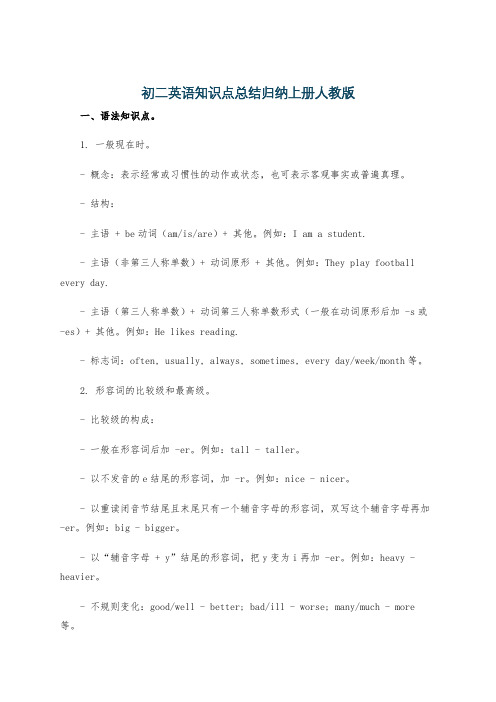
初二英语知识点总结归纳上册人教版一、语法知识点。
1. 一般现在时。
- 概念:表示经常或习惯性的动作或状态,也可表示客观事实或普遍真理。
- 结构:- 主语 + be动词(am/is/are)+ 其他。
例如:I am a student.- 主语(非第三人称单数)+ 动词原形 + 其他。
例如:They play football every day.- 主语(第三人称单数)+ 动词第三人称单数形式(一般在动词原形后加 -s或-es)+ 其他。
例如:He likes reading.- 标志词:often, usually, always, sometimes, every day/week/month等。
2. 形容词的比较级和最高级。
- 比较级的构成:- 一般在形容词后加 -er。
例如:tall - taller。
- 以不发音的e结尾的形容词,加 -r。
例如:nice - nicer。
- 以重读闭音节结尾且末尾只有一个辅音字母的形容词,双写这个辅音字母再加-er。
例如:big - bigger。
- 以“辅音字母 + y”结尾的形容词,把y变为i再加 -er。
例如:heavy - heavier。
- 不规则变化:good/well - better; bad/ill - worse; many/much - more 等。
- 比较级的用法:- 表示两者之间的比较,常用结构“比较级+than”。
例如:He is taller than me.- 最高级的构成:- 一般在形容词后加 -est。
例如:tall - tallest。
- 以不发音的e结尾的形容词,加 -st。
例如:nice - nicest。
- 以重读闭音节结尾且末尾只有一个辅音字母的形容词,双写这个辅音字母再加-est。
例如:big - biggest。
- 以“辅音字母 + y”结尾的形容词,把y变为i再加 -est。
例如:heavy - heaviest。
八年级上册英语知识点归纳总结
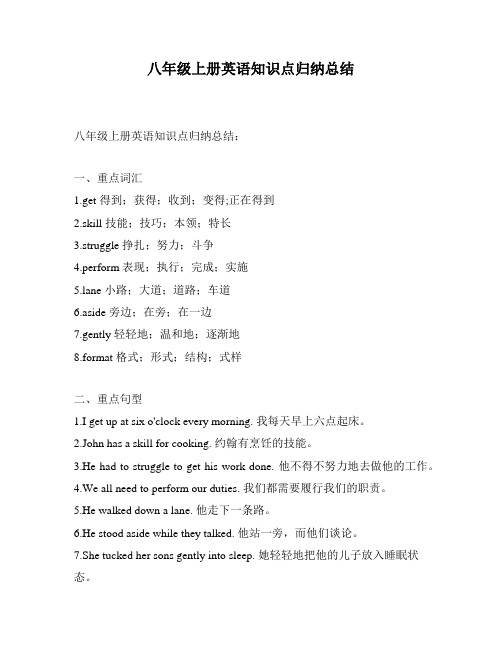
八年级上册英语知识点归纳总结八年级上册英语知识点归纳总结:一、重点词汇1.get 得到;获得;收到;变得;正在得到2.skill 技能;技巧;本领;特长3.struggle 挣扎;努力;斗争4.perform 表现;执行;完成;实施ne 小路;大道;道路;车道6.aside 旁边;在旁;在一边7.gently 轻轻地;温和地;逐渐地8.format 格式;形式;结构;式样二、重点句型1.I get up at six o'clock every morning. 我每天早上六点起床。
2.John has a skill for cooking. 约翰有烹饪的技能。
3.He had to struggle to get his work done. 他不得不努力地去做他的工作。
4.We all need to perform our duties. 我们都需要履行我们的职责。
5.He walked down a lane. 他走下一条路。
6.He stood aside while they talked. 他站一旁,而他们谈论。
7.She tucked her sons gently into sleep. 她轻轻地把他的儿子放入睡眠状态。
8.Can you show me the format for your report? 你能给我展示你报告的格式吗?三、重点语法1.一般现在时:表示习惯性活动或客观存在的事实,其句型结构是主+谓,例如:It rains a lot here.2.一般过去时:表示过去发生的动作或存在的状态,其句型结构是主+谓+过去分词,例如:He waited for me yesterday.3.现在完成时:表示从过去至现在,经过时间段一直延伸到如今,其句型结构是主+have/has+过去分词,例如:We have learned English for two months.4.现在进行时:表示说话时正在发生的动作,其句型结构是主+be(am/is/are)+动词ing,例如:They are watching TV now.四、重点短语1.lie down躺下;躺着2.in all总共;共计;终共3.keep up with跟上;追赶;追上e true实现;变成事实5.break out爆发;开始;发生6.go by过去;消逝7.let out释放;泄露;发出8.figure out弄清楚;解决;想出五、重点语境1.What did you get for the birthday present? 你给他买生日礼物是什么?2.I think she has a great skill in writing. 我想她写作有不错的技巧。
八年级上册英语知识点归纳整理

八年级上册英语知识点归纳整理英语八年级上册知识点总结一、 v+ do1. Let sb do sth 让某人做某事Let sb not do sth 让某人不做某事2.why not do sth = why don’t you do sth 做什么怎么样为什么不做?Why not put on a raincoat, its raining outside. 外面在下雨,为什么不穿个雨衣呢?3. Make sb do sth 使某人做某事I will do my best to make my dream e true. 我会尽我所能去使我的梦想实现。
Make sb + adj 使某人………..The story makes us happy。
二、v+ doing1. practice doing sth 练习做某事 our English teacher told us to practice speaking English every day。
英语教师叫我们每天练习说英语。
2. finish doing sth 完成做某事 my mum asks me to finishing cleaning up my room beforeshe e from work。
妈妈要求我在她下班回来之前清扫干净我的房间。
3. Enjoy doing sth 享受做某事The boys are enjoying playing basketball 孩子们正在操场上享受打篮球。
4. stand doing sth 忍受做某事她不能忍受欺骗别人5. mind doing sth 介意做某事? 你介意开门吗?6. keep doing sth.继续做某事She will keep fighting in this new semester. 在新学期,她将继续努力奋斗7. miss 想念 I miss you very muchMiss sth 错过………….he got up late this morning,so he missed the busMiss doing sth 错过做某事。
八年级上册英语知识点最新
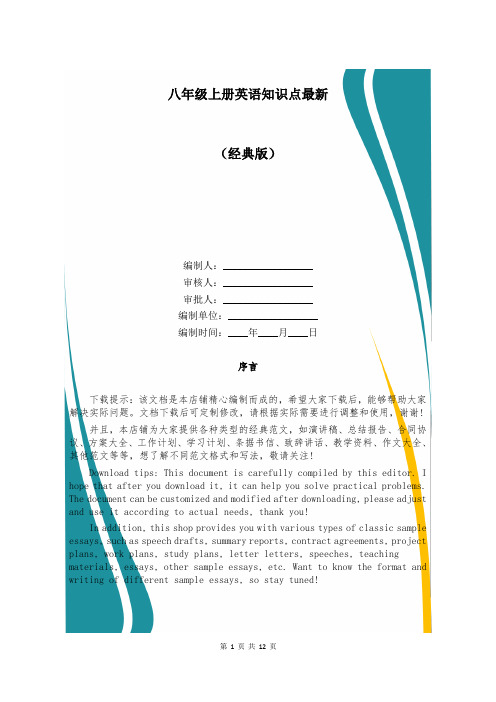
八年级上册英语知识点最新(经典版)编制人:__________________审核人:__________________审批人:__________________编制单位:__________________编制时间:____年____月____日序言下载提示:该文档是本店铺精心编制而成的,希望大家下载后,能够帮助大家解决实际问题。
文档下载后可定制修改,请根据实际需要进行调整和使用,谢谢!并且,本店铺为大家提供各种类型的经典范文,如演讲稿、总结报告、合同协议、方案大全、工作计划、学习计划、条据书信、致辞讲话、教学资料、作文大全、其他范文等等,想了解不同范文格式和写法,敬请关注!Download tips: This document is carefully compiled by this editor. I hope that after you download it, it can help you solve practical problems. The document can be customized and modified after downloading, please adjust and use it according to actual needs, thank you!In addition, this shop provides you with various types of classic sample essays, such as speech drafts, summary reports, contract agreements, project plans, work plans, study plans, letter letters, speeches, teaching materials, essays, other sample essays, etc. Want to know the format and writing of different sample essays, so stay tuned!八年级上册英语知识点最新英语的学习是需要持之以恒的。
- 1、下载文档前请自行甄别文档内容的完整性,平台不提供额外的编辑、内容补充、找答案等附加服务。
- 2、"仅部分预览"的文档,不可在线预览部分如存在完整性等问题,可反馈申请退款(可完整预览的文档不适用该条件!)。
- 3、如文档侵犯您的权益,请联系客服反馈,我们会尽快为您处理(人工客服工作时间:9:00-18:30)。
为了方便广大同学们更好的学习英语以及更好的复习,以下是分享的八年级上册英语知识点总结归纳,希望能帮助到大家!Unit1 Where did you go on vacation?【重点语法】不定代词:不指名代替任何特定名词或形容词的代词叫做不定代词。
用法注意:1. some 和any +可数名/不可数名。
some 多用于肯定句,any多用于否定句、疑问句和条件从句。
有些问句中用some,不用any, 问话者希望得到对方肯定回答。
2. 由some, any, no, every 与 body, one, thing构成的复合不定代词作主语时,其谓语动词用三单。
3. 不定代词若有定语修饰,该定语要置于其后:如:something interesting【重点短语】1. buy sth for buy sb. sth 为某人买某物2. taste + adj. 尝起来……3. nothing...but + V.(原形) 除了……之外什么都没有4. seem + (to be) + adj 看起来5. arrive in + 大地方 / arrive at + 小地方到达某地6. decide to do sth. 决定做某事7. try doing sth. 尝试做某事 / try to do sth. 尽力做某事8. enjoy doing sth. 喜欢做某事9. want to do sth. 想去做某事10. start doing sth. 开始做某事=begin doing sth.11. stop doing sth. 停止做某事区分: stop to do sth. 停下来去做某事12. dislike doing sth. 不喜欢做某事14. so + adj + that + 从句如此……以至于……16. tell sb. (not) to do sth. 告诉某人(不要) 做某事17. keep doing sth. 继续做某事18. forget to do sth. 忘记去做某事 / forget doing sth 忘记做过某事【词语辨析】1. take a photo/ take photos 拍照quite a few+名词复数“许多…”2. seem + 形容词看起来…... You seem happy today.seem + to do sth. 似乎/好像做某事 I seem to have a coldIt seems + 从句似乎..…. It seems that no one believe you.seem like ... 好像,似乎….. It seems like a good id ea.3. arrive in +大地点=get to=reach+地点名“到达......”arrive at +小地点(注:若后跟地点副词here/there/home, 介词需省略,如: arrive here; get home)4. feel like sth 感觉像…feel doing sth. 想要做某事5. wonder(想知道)+疑问词(who, what, why)引导的从句。
6. because of +名/代/V-ingbecause+从句He can’t take a walk because of the rain.I don’t buy the shirt because it was too expensive.7. enough +名词足够的…...形容词/副词+enoughUnit2 How often do you exercise?【重点语法】1. 频率副词: always, usually, often, sometimes, never频率副词在句中通常放在实义动词之前, be动词或助动词之后。
常用于一般现在时态中。
2.“次数”的表达方法一次 once,两次twice,三次或三次以上:基数词+ times, 如:three times, five times,3. how often“多久一次”问频率,回答常含有频率词组或短语。
常见的how疑问词:1)How soon 多久(以后)—How soon will he be back?他多久能回来?—He will be back in a month. 他一个月后能回来。
2)how long “多久”—How long did it take you to clean the house? 你打扫房子用了多久?—It took me half an hour to clean the house. 我打扫这房子用了半小时。
3)How many+名复How much+不可名“多少” 问数量(how much 还可问价格)【重点短语】1. go to the movies 去看电影2. look after=take care of 照顾3. surf the internet 上网4. healthy lifestyle 健康的生活方式5. go skate boarding 去划板6. keep healthy=stay healthy 保持健康7. eating habits 饮食习惯8. take more exercise 做更多的运动9. the same as 与什么相同10. be different from 不同11. once a month一月一次12. twice a week一周两次13.make a difference to 对......有影响/作用14. most of the students=most students15. shop=go shopping=do some shopping 购物16. be good for 对......有益17. be bad for 对......有害18. come home from school放学回家19. of course=certainly=sure 当然20. get good grades 取得好成绩21. keep/be in good health 保持健康22. take a vacation 去度假【词语辨析】1. maybe / may bemaybe 是副词,意为“大概,可能,或许”,一般用于句首。
May be是情态动词,意为“可能是...,也许是...,大概是...”.The baby is crying. Maybe she is hungry.The woman may be a teacher.2. a few / few / a little / littlePeople can live to 100, but few people can live to 150.There is little time left. I won’t catch the first bus.Could you give me a little milk?3. hard / hardlyhard作形容词,意为“困难的,艰苦的,硬的”;作副词,意为“努力地,猛烈地”。
hardly为副词,意为“几乎不”。
The ground is too hard to dig.I can hardly understand them.It’s raining hard. The people can hardly go outside.4. As for homework , most students do homework every day .as for...意思是“至于;关于”,+名词、代词或动词的-ing形式(即动名词)。
如: As for him,I never want to see him here.至于他,我永远不希望在这里见到。
As for the story,you'd better not believe it.关于那故事,你最好不要相信。
5. That sounds interesting.这是“主语+系动词+表语”结构的简单句。
sound(听起来),look(看起来),smell(闻起来),taste(尝起来),feel(觉得),seem(好象),grow(变得),get(变得)等词在英语中可用作系动词,后跟形容词作表语。
如:It tastes good. 这味道好。
The music sounds very sweet. 这音乐听起来很入耳。
The smoke grew heavier and heavier. 烟雾变得越来越浓了。
6. percent 名词,意为“百分之……”百分数的表示方法:基数+ percent (不用复数形式),percent做主语时,谓语动词的数要根据其后面的名词来确定。
50%:fifty percent 百分之五十Fifty percent of the apples are bad. 50%的苹果都坏了。
Twenty percent of the meat is in the fridge. 20%的肉都在冰箱7. not… at all 意为“一点也不”,not应放在be动词、情态动词或助动词之后。
The story isn’t interesting at all. 那个故事一点也没有趣。
8. It is + adj. to do sth. 做某事是……的。
It is interesting to play computer games. 玩电脑很有趣。
9. take, spend, payIt takes sb. some time to do sth. 意为“花费某人……时间来做某事”。
人(sb.) spend 时间/钱on sth. “买某物花了……钱”。
人(sb.) spend 时间/钱(in) doing“花费多少时间来做某事”。
pay 的主语必须是人,而“花钱买某物”为pay...for...10. however 副词,意为“然而,可是”,表示转折关系,可放在句首、句中、句末。
Unit3 I’m more outgoing than my sister.【重点语法】1. 形容词和副词的比较等级(1)形容词和副词的原形就是原级(2)比较级,表示较……或更……(3)最高级,表示最...。
2. 比较级句型:(1)A + be动词+形容词的比较级+than +B “A比B更……”(注意:A与B 必须是同级的,即必须是人与人,物与物进行对比)(2)“A+实意动词+副词比较级+ than + B”表示“A比B…”(3)比较A ,B两人/两事物问其中哪一个较…...时用句型:“Who/which +谓语动词+ 比较级,A or B ?”Who is thinner, Jenny or Mary?3. 比较级的特殊用法(1)“比较级+and+比较级”,意为“越来越”。
